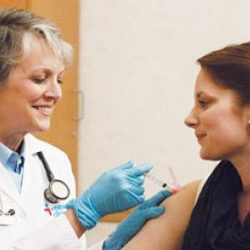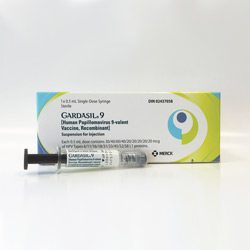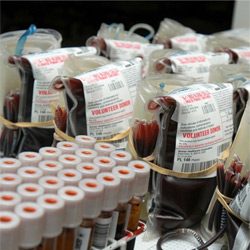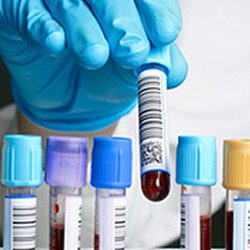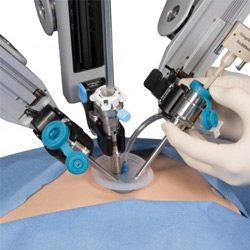Cancer patients could be dealing with double trouble. Some medications used to treat cancer can actually cause heart disease. But now doctors are working more closely together to make sure patients dont end up with more problems than they started with. 29-year-old Abby jones always tries to look on the bright side, but life hasn't been so picture perfect lately. At 29 I … [Read more...]
Cancer News

Researchers develop a new therapy for lung cancer
There is good news for lung cancer patients that researchers has developed a new therapy for lung cancer. A multidisciplinary team led by Johns Hopkins researcher Venu Raman, Ph.D., with notable contributions from Guus Bol, Farhad Vesuna and Phuoc Tran of Johns Hopkins, has identified a new therapy for lung cancer, the most common cancer worldwide. The therapy has been in … [Read more...]
Collaborative research team solves cancer-cell mutation mystery
More than 500,000 people in the United States die each year of cancer-related causes. Now, emerging research has identified the mechanism behind one of the most common mutations that help cancer cells replicate limitlessly. Approximately 85 percent of cancer cells obtain their limitless replicative potential through the reactivation of a specific protein called telomerase … [Read more...]
Cancer drugs can treat Down syndrome and other brain disorders: A Study
A study has proved that cancer drugs can treat Down syndrome and other brain disorders. A class of FDA-approved cancer drugs may be able to prevent problems with brain cell development associated with disorders including Down syndrome and Fragile X syndrome, researchers at the University of Michigan Life Sciences Institute have found. The researchers' proof-of-concept study … [Read more...]
Chemo before surgery benefits patients with advanced ovarian cancer: A Study
A study has proved that chemotherapy before surgery benefits patients with advanced ovarian cancer. Women with advanced ovarian cancer have fewer side effects and tend to have a better quality of life if given chemotherapy before surgery, according to a Cancer Research UK study published in The Lancet. The CHORUS trial, conducted at the Medical Research Council Clinical Trials … [Read more...]
Latest 9-valent HPV vaccine to be prevent 80 percent of cervical cancers: New Research
The new 9-valent human papillomavirus vaccine, can potentially prevent 80 percent of cervical cancers in the United States, if given to all 11- or 12-year-old children before they are exposed to the virus. In addition to protecting against 80 percent of cervical cancers, the new 9-Valent human papillomavirus vaccine, which includes seven cancer causing HPV-types -- … [Read more...]
Physical exercise helps women undergoing Chemotherapy: A Netherlands Cancer Institute Study
A study has proved that physical exercise helps women with breast cancer undergoing chemotherapy. Women with breast cancer who follow a physical exercise program during their chemotherapy treatment experience less side effects like fatigue, reduced physical fitness, nausea and pain. It is also less often necessary to adjust the dosage of their chemotherapy. This is shown by a … [Read more...]
Moderate exercise may make cancer treatments more effective: Kinesiologist
Kansas State University kinesiology research offers encouraging information for cancer patients: A brisk walk or a slow jog on a regular basis may be the key to improved cancer treatments.Brad Behnke, associate professor of exercise physiology, and collaborators have shown that moderate exercise on a regular basis enhances tumor oxygenation, which may improve treatments in … [Read more...]
One in two British people will be diagnosed with the cancer at some point in their lives: Cancer Research UK
A study has inferred that one in two British people will be diagnosed with the cancer at some point in their lives. Previous calculations that indicated cancer will affect just over one in three people were underestimating the scale of the disease, according to a new analysis by Cancer Research UK. However, because of advances in treatment and early detection, more people are … [Read more...]
Two-thirds of bowel cancer patients aren’t advised to exercise despite health benefits
More than two-thirds (69 per cent) of bowel cancer patients say they weren't advised to exercise regularly after their diagnosis -- despite evidence that brisk physical activity is linked to better survival in bowel cancer, according to a Cancer Research UK study published in BMJ Open. The research, from the Cancer Research UK Health Behaviour Research Centre at UCL … [Read more...]
Best practice guidelines released for cervical cancer screening
The American College of Physicians (ACP) has released best practice guidelines to reduce overuse of cervical cancer screening for average-risk women, including what ages screening should start, stop and how many years to wait between each test. "Guidelines recommend not screening prior to age 21, screening no more frequently than every 3 years and ending screening among … [Read more...]
New treatment for advanced cervical cancer patients
A new treatment of advanced cervical cancer has been approved by European Commission. The European Commission has licensed Avastin in combination with standard chemotherapy for the treatment of women with advanced cervical cancer. Until now, the treatment has been available ahead of licence to eligible patients in England via individual requests to the Cancer Drugs Fund … [Read more...]
Lesbians may be at heightened risk of cervical cancer: A Study
A study has inferred that lesbians may be at heightened risk of cervical cancer. They may be at higher risk of cervical cancer because they get fewer screenings than heterosexual women, due partly to doctors' sometimes incorrect assumptions about their sexual history, University of Washington researchers said on Tuesday. Although nearly all cases of cervical cancer … [Read more...]
Detecting lung cancer at an early stage: ‘Spectral histopathology’ facilitates prognosis regarding tumour aggressiveness
A new diagnostic method, namely spectral histopathology, facilitates marker-free detection of individual subtypes of lung cancers. It was developed by researchers at the PURE consortium at Ruhr-Universität Bochum (RUB). They have successfully applied it in collaboration with clinicians at the Ruhrlandklinik in Essen. It is an automatable imaging process which, by … [Read more...]
Risk of ovarian cancer may reduce if pregnancy is delayed: A Study
A study has inferred that risk of ovarian cancer may be reduced if pregnancy is delayed. Women who give birth to their first child in their mid-30s or later may have a lower risk of ovarian cancer compared with those who give birth to their first child earlier than that, a new study suggests. Researchers analyzed information from nearly 1,700 women living in Los … [Read more...]
Gardasil 9 HPV vaccine now available in Canada
Merck Canada Inc. has announced the availability of the new Gardasil 9 HPV vaccine, following approval by Health Canada. The Gardasil 9 vaccine helps prevent against diseases associated with the HPV types 6, 11, 16, 18, 31, 33, 45, 52 and 58. These nine HPV types are known to cause approximately 90% of cervical cancers, 80% of cervical precancers, 75% of HPV-related vulvar, … [Read more...]
Smaller plates, smaller portions? Not always
It may have become conventional wisdom that you can trick yourself into eating less if you use a smaller plate. But a UConn Health study finds that trick doesn't work for everyone, particularly overweight teens. "It has been assumed that overweight or obese consumers are more likely than others to underestimate the size of a food serving and accordingly overeat--particularly … [Read more...]
Platelet Bioreactor
Every year in the U.S., nearly two-point-two million platelet units from donors are transfused to treat patients undergoing chemotherapy or surgery. But increasing demand, a short shelf life and risk of contamination keep platelets in tight supply. Now a new way to generate them could radically transform how we deal with the shortage. In the aftermath of a storm or other … [Read more...]
Colorectal Cancer Screenings Could Save Lives
Colorectal cancer, also known as colon cancer, is most often found in people 50-years or older. It's the second most common cancer killer in the U.S., but doctors and other experts say it doesn't have to be. Doctors, nurses and other officials from groups like the American Cancer Society gathered in Bridgeport to bring awareness to the importance of colorectal … [Read more...]
Genetic variations may influence effect of aspirin, NSAIDs on colorectal cancer risk
Numerous studies have associated the use of aspirin and other nonsteroidal anti-inflammatory drugs, or NSAIDs, with reduced risk of colorectal cancer. But according to a new study published in JAMA, this effect may depend on certain genetic variations an individual possesses. While many other studies have reported similar findings with use of aspirin and other NSAIDs, the … [Read more...]
New colon cancer culprit found by vet researchers
Colon cancer is a heavily studied disease -- and for good reason. It is one of the leading causes of cancer-related deaths worldwide, and its numbers are on the rise, from 500,00 deaths in 1990 to 700,000 in 2010. This growth comes despite scientists' ever-increasing knowledge of the genetic mutations that initiate and drive this disease. Now, a team of researchers from the … [Read more...]
Tumour determination in bowel cancer: blood test replaces surgery
A new study at the MedUni Vienna's Comprehensive Cancer Center (CCC) is assessing patients with metastasised bowel cancer to determine whether it is possible to characterise tumour and better control resistance mechanisms with a blood test. The aim of this is to spare patients the stress of having tissue removed via biopsies and to make the targeted use of therapy … [Read more...]
High-end imaging: New blending techniques
Vanderbilt University researchers have achieved the first "image fusion" of mass spectrometry and microscopy -- a technical tour de force that could, among other things, dramatically improve the diagnosis and treatment of cancer. Microscopy can yield high-resolution images of tissues, but "it really doesn't give you molecular information," said Richard Caprioli, Ph.D., … [Read more...]
New drug approved for deadly pediatric cancer
Unituxin (dinutuximab) has been approved by the U.S. Food and Drug Administration to treat children with high-risk neuroblastoma, a rare cancer that most often affects children aged five and under. Children with the cancer, which forms from immature nerve cells, have only a 40 percent to 50 percent chance of survival despite aggressive treatment, the FDA said Tuesday in a … [Read more...]
Using Robots to Remove the Esophagus
Last year in the United States, doctors diagnosed 18,000 new cases of cancer of the esophagus, the muscular tube that connects the throat to the stomach. While no one is sure exactly what causes it, age, gender, and a history of acid reflux are risk factors. Now, surgeons are using a new technique to remove the esophagus and help patients recover faster than ever before. The … [Read more...]
One in two people in the UK will get cancer, experts forecast
One in two people will develop cancer at some point in their lives, according to the most accurate forecast to date from Cancer Research UK, and published in the British Journal of Cancer. The new figure highlights the urgent need to bolster public health and NHS cancer services so they can cope with a growing and ageing population and the looming demands for better … [Read more...]
Latinas in New Orleans encouraged to get screened for cervical cancer
The United States Congress designated January as Cervical Health Awareness Month, and during this month, various organizations are emphasizing the importance of early detection of cervical cancer. Each year, an estimated 12,000 women are diagnosed with cervical cancer, and of those, about one third will die as a result of that disease, according to Centers for Disease Control … [Read more...]
New recommendation for cervical cancer screening, using HPV test alone
fitness news , Font size Cancer New recommendation for cervical cancer screening, using HPV test alone - Reported, January 12, 2015 About 80 million U.S. women ages 25 to 65 should be screened periodically by their health care providers for cervical cancer. At present, the standard way to do that is a Pap smear alone, or co-testing using … [Read more...]
Sticking to lifestyle guidelines may reduce risk for certain cancers and for overall mortality
fitness news , Font size Cancer Sticking to lifestyle guidelines may reduce risk for certain cancers and for overall mortality - Reported, January 08, 2015 Study of nearly a half-million Americans has found that following cancer prevention guidelines from the American Cancer Society may modestly reduce your overall risk of developing … [Read more...]
Sticking to lifestyle guidelines may reduce risk for certain cancers and for overall mortality
fitness news , Font size Cancer Sticking to lifestyle guidelines may reduce risk for certain cancers and for overall mortality - Reported, December 16, 2014 Lung cancer is the number-one cause of cancer related deaths in America. Four-hundred and fifty people die each day from this disease. Startling numbers, but doctors say we can still … [Read more...]
- « Previous Page
- 1
- …
- 9
- 10
- 11
- 12
- 13
- …
- 37
- Next Page »





